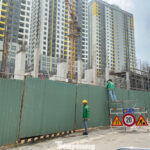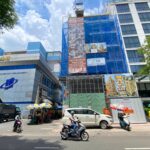On the morning of November 14th, Minister of Construction Tran Hong Minh addressed the National Assembly, emphasizing the revised Construction Law’s focus on streamlining legal frameworks, reducing administrative burdens, and enhancing investment management efficiency.
Construction Permits: A Burden No More
“Obtaining construction permits has long been a cumbersome process for citizens and businesses alike. Historically, every stakeholder—from government agencies to enterprises—has faced this challenge,” Minister Minh stated.
He explained that detailed planning already outlines investment scale, architectural design, structural integrity, and fire safety measures. These requirements are reiterated during feasibility studies, technical designs, and construction blueprints.

Minister of Construction Tran Hong Minh. Photo: QH |
“Requiring additional permits before construction begins only prolongs the process, which is illogical,” he added.
The revised law aims to shorten procedures. Projects with approved plans and designs will no longer require permits unless they lack detailed planning or exceed seven stories. Local authorities have been instructed to simplify permit issuance, reducing processing times from 30 days to 7–10 days under Decree 145/2021/NĐ-CP.
Citizens will also benefit from simplified procedures. While professional design consultation remains necessary, permits will no longer be mandatory. Instead, adherence to structural, architectural, fire safety, and environmental standards will suffice.
Streamlining Procedures, Accelerating Project Development
Minister Minh highlighted concerns over prolonged feasibility studies, designs, and procurement processes, which delay project implementation. “From investment approval to groundbreaking, projects often take 2–3 years. Adjustments during this period inflate costs due to rising material and labor prices,” he noted.

Minister of Construction Tran Hong Minh. Photo: QH
|
To address this, the ministry empowers investors to self-approve certain stages, reducing subsequent steps. For instance, technical designs now incorporate 100% of survey data, compared to 30% in preliminary designs, minimizing errors and cost overruns.
“We’ve developed guidelines to consolidate approvals into fewer stages, saving time and ensuring smoother project execution,” Minh explained.
The revised law proposes two management models: provincial-level professional management boards and commune-level project management boards, tailored to local conditions. Commune boards may hire consultants if lacking expertise, with costs based on actual work.
“Thirty-four provinces have piloted this model. Once the revised law passes, all localities will adopt it, ensuring uniformity, efficiency, and transparency,” Minh concluded.
Trong Phu
– 13:29 14/11/2025
Unveiling the Truth: Land Officers’ Role in Preventing Unauthorized Construction on Others’ Property
“The incident in Hai Phong, where a house was mistakenly built on someone else’s land due to incorrect guidance from an intermediary, highlights a critical issue. If local authorities had conducted proper pre-inspections and land officers had accurately designated the construction site for the homeowner, this error could have been entirely avoided,” stated Delegate Pham Van Hoa.
Ho Chi Minh City Transfers Authority to Issue Construction Permits to Commune-Level People’s Committees
The Ho Chi Minh City Department of Construction has been tasked with developing a software application to monitor the issuance of time-bound construction permits and track the validity period of permitted structures. This system will enable commune-level People’s Committees to implement the process seamlessly, ensuring full connectivity and integration with the Department of Construction’s network.
Unauthorized Construction: Who Will Enforce the New Regulations?
The People’s Committee of Ho Chi Minh City has issued a new decree delegating authority for construction order management, effective November 20th.




















